If you’re thinking about raising backyard hens for eggs, you might feel a little bit intimidated by the process. Is this a hard process, or an easy process? How do you get started? And so on.
Luckily, chickens are some of the easiest animals you can raise – but it’s important to learn how to do it correctly. In this article, we’ll walk you through some of the most important information you need to know in order to get started.
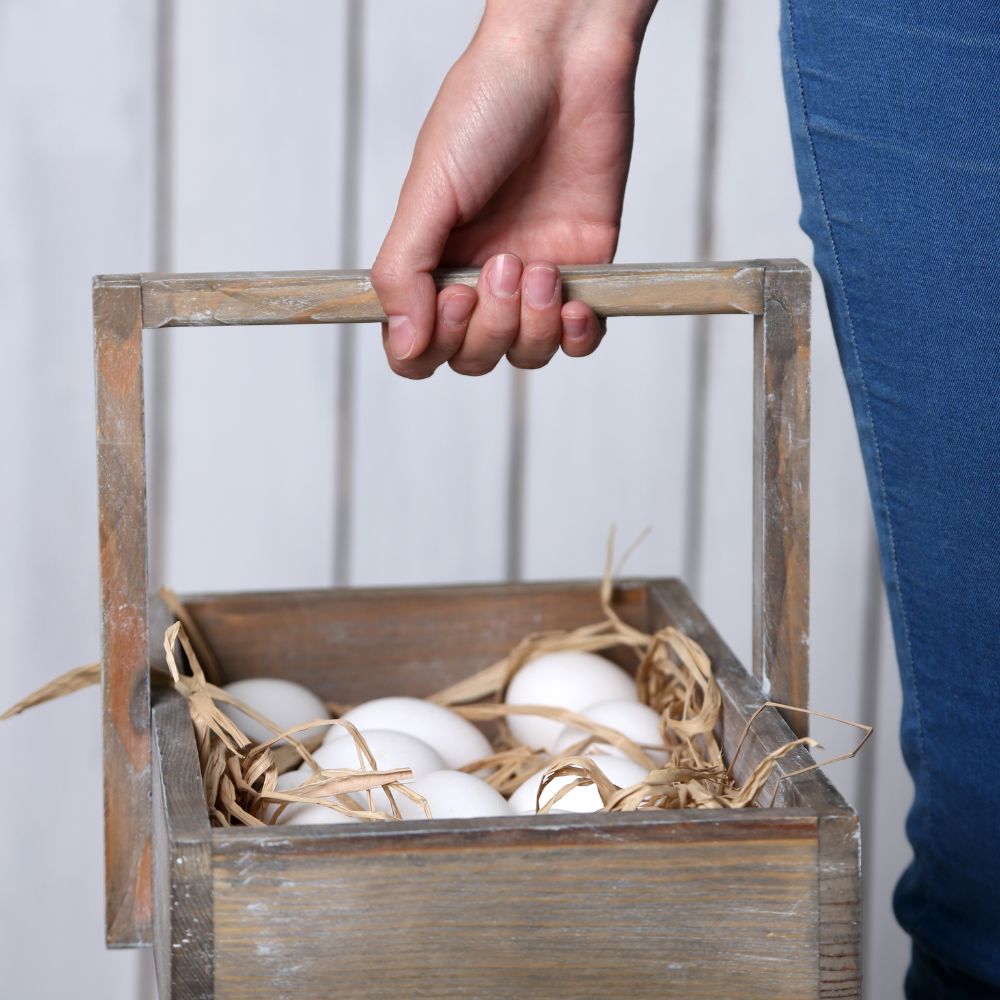
Table of Contents (Quickly Jump To Information)
Why Raise Backyard Chickens?
In these uncertain times, a lot of people are concerned about food security. Raising chickens means always having a supply of fresh, organic eggs (even as the prices in the stores skyrocket). You can keep your egg production…well, productive!
Chickens are easier to care for than dogs or cats. They only need:
- A home
- Food
- Water
- Protection from predators
- Veterinary care as needed
Unlike dogs, you never need to walk poultry! You can also leave them alone for a couple days (with food, water, and protection from predators) if you need to leave town for a few days. Hens are quiet, and like parrots, these birds can provide companionship. They’re also a great pet for kids!
How Do I Get Started Raising Chickens? Quick Overview!
Buy the Chickens!
Your first step in raising chickens? You’ve got to buy the chickens, of course! Don’t rush out to the feed store to purchase your chicks right away. Make sure you have a brooder set up and ready to go so that you have somewhere to put the little fluffy butts. This should include a heat lamp and plenty of food and water.
You probably want to do a little research on chicken breeds, so you get the best fit your needs, your plans, and your set up. Are you wanting super egg layers? Do you want dual-purpose birds?
If you plan on raising adult chickens, you can skip this step. Otherwise, keep reading – we’ll give you more information on where to buy your chickens below.
Feed
You are also going to need an ample supply of feed to give your chickens. We’ll talk more about this later in the article, but make sure you have your feeders ready to go.
Waterers
The same rule applies to waterers. You are going to need a waterer for your chickens so they can stay hydrated at all times. Invest in good waterer because they can last for quite some time when cared for properly.
A Coop
Last but not least, you’re going to need a coop in which to house your chickens. It doesn’t have to be huge, but there are some considerations you will need to make.
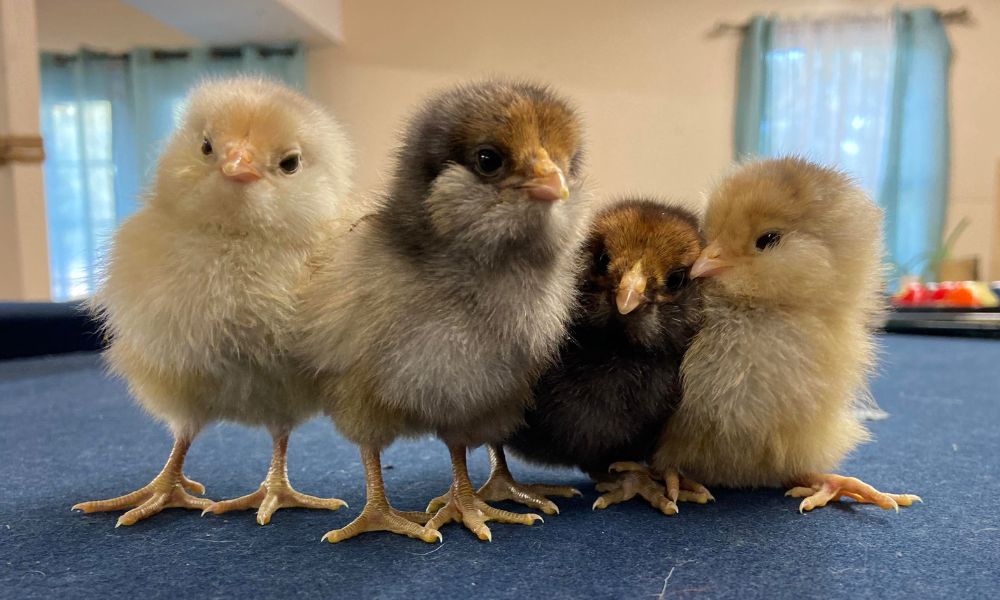
Where Can I Buy Chickens?
The first thing you need to do is purchase your chickens. Decide on your breed first. If you want your chickens to be pets as well as egg producers, some friendly breeds that give lots of eggs are Australorps, Orpingtons, Speckled Sussex, Brahmas, and Cochins.
Next, start the search for your birds. Hatcheries are often chosen by beginning chicken keepers because they raise and ship chicks in a safe, humane fashion. Yes, that’s right – you can get mail-order chicks!
When you order from a hatchery, the chicks are sent as one day old and sent directly to the post office. You’ll pick them up there. You will be able to choose from a wide selection of breeds. If you’re not allowed to have roosters in your neighborhood, you have the option to purchase only hens (female chickens called pullets as chicks).
There are hundreds of hatcheries out there, but it’s important to find one that is reputable. We use Cackle Hatchery, but there are other good options including Murray McMurray and Meyer Hatchery. Do your research and make sure your hatchery of choice has plenty of positive customer reviews!
You may also want to check out local farm stores. Most people are familiar with shops like Tractor Supply, Rural King, and Orschelns. The only downside to purchasing chicks from a farm store is that you are often limited to what they have in store. That said, some stores allow you to place an order ahead of time in which you can specify how many and what breed you are interested in buying.
A final option is to consider local breeders or even your neighbors. The internet is a glorious invention that makes it possible for us to find chicks for sale just about anywhere! Just remember to inspect your chicks carefully before you bring them home to make sure they are healthy.
How Much Should I Pay for a Chicken?
In most cases, a baby chick will cost less than $5 apiece. Often, that price is quoted by hatcheries with all expenses – including shipping fees – rolled in. After all, buying chicks should not break the bank! Of course, prices change according to supply and demand, as well as market trends.
Hatcheries will sometimes offer discounts if you buy in bulk – with discounts usually given for purchases of 25, 50, or 100 birds – or if you purchase unsexed chicks.
You can also purchase adult chickens that are ready to lay. While the price of these can vary widely depending on the breed and age of the bird, try not to pay more than $10 to $20. It’s very easy for you to find yourself scammed or overcharged!
If you want to buy adult chickens, keep an eye out for free birds on Craigslist, Facebook Marketplace, and via other Facebook groups. Again just be aware of scams and don’t be afraid to ask health questions.
What Do Chickens Eat?
Chickens are easy creatures to feed, but you will need to pay attention to what you are feeding them – especially in the early days.
Young chicks (those under the age of 16 weeks) need to be fed a chick starter ration. This contains 18% protein and all the nutrients your chicks need to be healthy. You can purchase chick starter from your local farm store. If you want a feed that has some extra added nutrients and have it shipped directly to your home, you can purchase chick starter from our website here.
Once your chickens get a bit older, you’ll need to provide them with alternative feed. Laying feed is fine for laying hens – it contains extra calcium – while broiler feed is best for meat birds. If you want layer feed shipped directly to your door, visit our store here.
Chickens are some of the best backyard pets you can raise because they are incredibly versatile creatures that can be fed a wide variety of kitchen scraps and leftovers. If you want to read a full list of what chickens can and cannot eat, be sure to check out this post.
What Type of Waterers Are Best?
Having plenty of fresh, clean water at all times is just as important as having plenty of fresh feed. Although you can use basic waterers from Amazon (here are some options), or even just a dog bowl with water for your adult chickens, you’ll need to be more careful about how you give water to young chicks.
Chicks can easily drown in open bowls of water, and while some people simply put pebbles or marbles in the bottom of their adult chicken waterer to prevent this, accidents can still happen. Therefore, you will want to use a mason jar-style waterer, which tends to be much safer to use. Watch the video below to learn more about chick waterers.
What Type of Coop is Best?
You can purchase your own chicken coop on Amazon or you can build your own chicken coop. Here are some free plans to help you get started. There are all kinds of styles you can choose from, including coops that are portable and meant to be moved every day, those that are designed for small flocks, and those that are best for oversized breeds.
Either way, remember that you will need at least six to ten feet of space per bird in your coop. You’ll need even more than that out in the run, so make sure you leave plenty of outdoor space for your birds, too.
Also in the coop, you will need to leave room for nesting boxes and roosting bars. The roosting bars should be no more than a few feet off the ground and positioned away from the nesting boxes.
You can purchase a coop for as little as $200 on Amazon. But remember that any structure can serve as shelter, as long as it’s dry, draft-free, and provides protection from predators. So, if you have a garden shed or even an old play house that’s no longer used by your kids, you have the start of a great coop!
How Much Room Do Chickens Need?
Experts recommend 10 square feet of space per chicken. So, if you have 3 hens, then your coop should be 30 square feet.
Your flock will also need a fenced-in run so they can get sunshine and exercise! If you can’t build a run, don’t worry. While it’s not ideal in all situations (due to predators), you can allow your chickens to free range (run around your yard) part of the day to stretch their wings.
Other Frequently Asked Questions
How do I keep my chickens safe from predators?
There are all kinds of creatures that like munching on chickens! From raccoons to coyotes, weasels to foxes, your chickens need to be protected from these threats. The easiest way to do this is to build a strong, secure chicken coop that can withstand any threat. Make sure it has no openings or gaps through which a predator can sneak and lock your chickens in each and every night.
You can find more tips on how to make your chicken coop predator-safe here.
What temperature is best for baby chicks?
As with all baby animals, young chicks are extremely susceptible to temperature fluctuations when they are first born. Baby chicks need to be kept in a warm place until they have all their feathers.
The brooder should be at least 95-100 degrees for the first two weeks of their lives, and then reduced five degrees each week until the chicks reach four weeks old.
Not sure if your chicks are too warm or too cold? Here’s a video that will tell you quick ways you can figure it out.
What kind of nesting boxes do I need?
You can build your own nesting boxes or you can purchase some prebuilt ones from the farm store or Amazon. Whichever you choose, make sure you have at least one nesting box for every four chickens. You’ll Want to fill it with fresh, clean bedding and check it at least once a day to keep it from becoming overrun with eggs.
Here are some more tips on what to look for and consider when researching nesting boxes.
When do chickens start laying eggs?
Wondering when all of your hard work is going to pay off – and your chickens are going to start laying eggs? If you’ve purchased layers, they should begin laying eggs right away.
You can learn more about when chickens start laying eggs by watching this video, but as a general rule of thumb, baby chicks start laying when they’re six months old. Some breeds, like White Leghorns, Sex Links, and Australorps start laying as early as sixteen weeks old, but others can take up to eight months to start laying.
How often do chickens lay eggs?
Most hens lay four to five eggs each week, but some breeds (like Production Reds) lay more and some less (such as Mille Fleurs). You can encourage better laying patterns by feeding a high-quality feed. Check out this article for more information!
Other nutrients chickens need
- Oyster shell is a great addition in order to provide good, healthy eggs with strong eggshells. Here’s a great option for you!
- Put special herbal blends like these in their nests to repel pests (like parasites), plus your hens will LOVE going into their nesting boxes to lay eggs.
- Provide specific areas for your hens to take dust baths, it’s a necessary process and helps keep them healthy. Here are my favorites.
- If your chickens don’t free range, you’ll likely want to provide grit to help aid them in digestion. You can think of grit like a substitute for teeth (chickens don’t have teeth).
Final Thoughts
Getting started with backyard chickens is very easy – and chickens are simple to care for! As long as they have shelter, food, water, protection from predators, and appropriate veterinary care, they’ll do great! If you do decide to dive right in, we have all the resources you need on this website!
Maat van Uitert is a backyard chicken and sustainable living expert. She is also the author of Chickens: Naturally Raising A Sustainable Flock, which was a best seller in it’s Amazon category. Maat has been featured on NBC, CBS, AOL Finance, Community Chickens, the Huffington Post, Chickens magazine, Backyard Poultry, and Countryside Magazine. She lives on her farm in Southeast Missouri with her husband, two children, and about a million chickens and ducks. You can follow Maat on Facebook here and Instagram here.

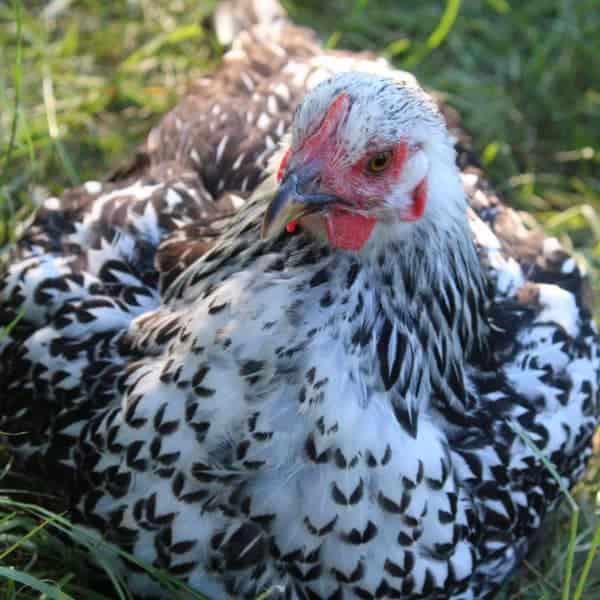
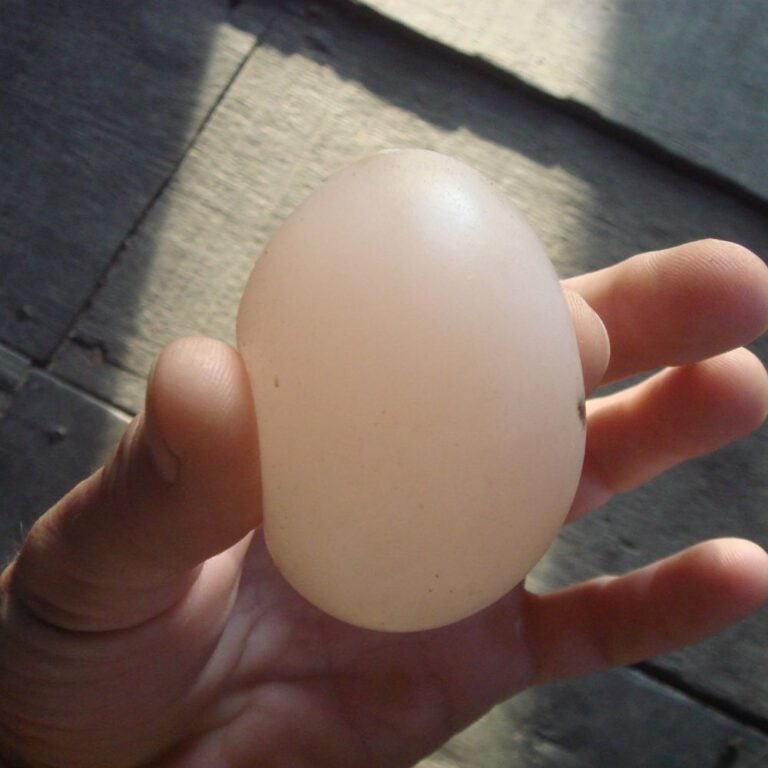
![Keep Chickens Cool In Hot Weather With These Pro Tips [Podcast]](https://thefrugalchicken.com/wp-content/uploads/2016/03/keeping-chickens-cool-in-hot-weather-feature-min.jpg)
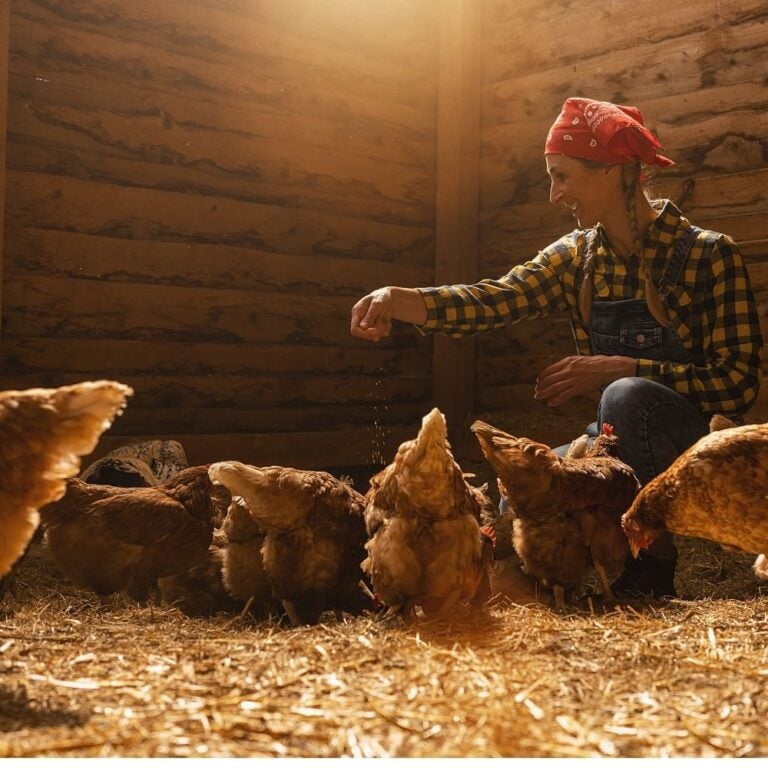
![Using Essential Oils To Raise Healthy Chickens [Podcast]](https://thefrugalchicken.com/wp-content/uploads/2015/10/Essential-oils-with-chickens.jpg)
![Eye Worms, Letting Chicks Outdoors, Getting Rid Of Mites, Fertile Grocery Store Eggs, & Greek Yogurt [Podcast]](https://thefrugalchicken.com/wp-content/uploads/2016/03/eye-worms-podcast-min.jpg)